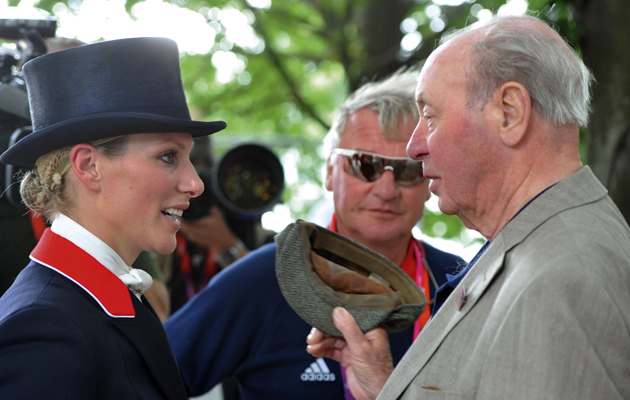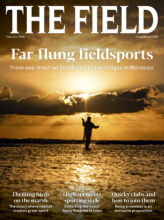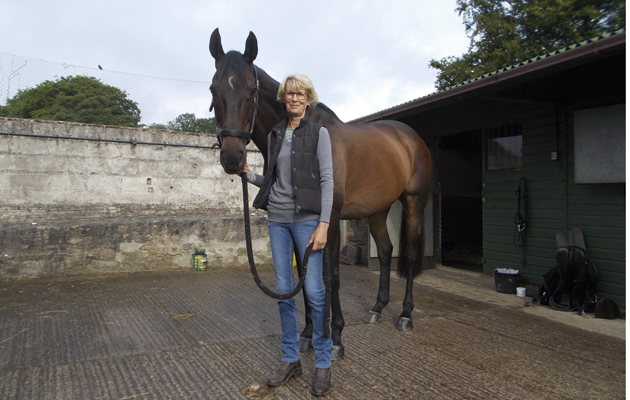We might not all be capable of making it to Burghley on our own horse. But being an event horse owner, with the thrills and excitement to match, is even better. Lucy Higginson tells you how you can
Owning an event horse is thrilling. The discipline that evolved form the hunting field and army training is now a top flight international sport with BBC coverage and a slew of famous owners. Does it have the same glamour as owning an Aintree foxhunter? Its disciples would be glad it doesn’t.
OWNING AN EVENT HORSE
Owning an event horse means you pay the bills, share all the nerves and thrills but are hardly ever spotted on TV at Burghley or Badminton. So why would you decide owning an event horse is for you? For many, it starts by accident. Each weekend for years you are roused from your bed long before dawn by a horsy daughter intent on flinging herself over monstrous fences. Gradually, the adrenalin rush from surviving with all bones intact becomes addictive, along with the countryside and the friends you make in the lorry park. But the daughter disappears to university, leaving you with a half-decent horse to muck out.
Before putting it up for sale, you toy with the idea of asking a professional rider to look it over. Within nanoseconds, a charming, bronzed demigod in breeches is in your kitchen offering to take the horse on, and suddenly you are dreaming of walking round Burghley sporting a prized owner’s badge. Before you know it you’ve joined the team supporting a talented and hard-working rider, your name echoing from rural PA systems. The bills rapidly become more terrifying than the fences, but – no matter – you have become an event horse owner – or should that be an O W N E R (Over-your-head With No Escape Route?) As with everything equestrian, you’re in for roller-coaster ride involving euphoria and heartache in equal measure, as Sarah Pelham can testify.
The sister of racehorse trainer Roger Charlton, Pelham has always ridden and fell into ownership when her daughters stopped eventing. She ended up with interests in a couple of horses with rider Tina Cook and was lucky enough to strike gold when one of them, Miner’s Frolic (stable name Henry) co-owned with Nick and Valda Embiricos, got a late call up for the British team at the Beijing Olympics (run in Hong Kong). He re-turned with team and individual bronze, and later won two European golds. “We were the real juniors on the team for Hong Kong,” says Pelham. “But Henry just loved the whole thing. He adores people and only wants to please. And he’s gorgeous-looking; he knows that.”
Yet within three years, the horse who had galloped effortlessly through Asian heat was fighting for his life, suffering from colitis after a long period on antibiotics. “It did him in; his gut went,” says Pelham. At one stage Cook advised her that Henry might well die; she rushed to the vets to see him.
“He looked like a skeleton,” she recalls. “I told him: ‘Look, if you can just pull yourself together, you can come and live with me forever.’” To widespread astonishment, the horse recovered completely to win a further team silver in London. By the time he retired last year, aged 16, he had won a staggering six championship medals. “It’s been the most incredible 10 years of highs and lows, and being on teams, travelling to championships, is wonderful,” says Pelham, who is now breeding from Henry’s full sister.
HOW DOES OWNING AN EVENT HORSE AND OWNING A RACEHORSE COMPARE?
With all her racing connections, however, she is aware how ownership differs between the sports.“With racing it may be possible to cover your costs,” she explains. “I am sorry, but in eventing you don’t, even if you have a good horse. Eventing prize-money is hopeless unless you win Badminton or Burghley.”
While a promising young event horse may be bought for less than a smartly bred racehorse – about £20,000 – the running costs are similar, ranging from about £15,000 to £20,000 a year for a novice horse, and up to £30,000 for a top one (as travelling costs and entry fees increase). But while a racehorse can be on the track at two, an eventer won’t reach his prime until he’s at least eight or nine.
On the other hand, “finding a good racehorse is like finding a needle in a haystack,” says Clive Smith, who nevertheless managed it several times, not least with the wonderful Kauto Star, who died in June. Smith now has an exciting event horse, Pamero, with Laura Collett, and may be correct in thinking it’s easier to find raw eventing talent.
He is ideally placed to compare a racehorse owner’s “raceday experience” with that of an eventing owner. “It’s quieter and a slower day, until you reach the big time. Racing is quick-fire stuff. But then I’ve been spoilt, with horses in major races,” he says. “On the other hand, the people are different in eventing; everyone helps one another. Racing is more individual and cutthroat – because there’s so much more money in it, I suppose.”
Fellow owner Cathy Butler goes further: “In no other discipline will you see an owner washing their horse off or grazing it by the lorry,” she points out. “Most event-horse owners have a real passion for horses and have had other interests in the equine world. You don’t find people doing it for champagne and boxes. We don’t need that.”
BECOMING AN EVENT HORSE OWNER
Butler became an owner when she realised she had “a pretty smart horse and I wasn’t going to be able to develop his full potential”. Slightly to her surprise, perhaps, she finds owning a horse with another rider just as hard on the nerves as riding it herself. “When I sent one out I thought it would be much more exciting and less nerve-racking. It’s not! You’re not in charge of your own destiny and I’m just as much of a gibbering wreck.”
She is chairman of the Event Horse Owners Association (EHOA) which was founded around 17 years ago to give owners more clout. It’s partly down to this organisation that owners are better recognised these days in prize-givings and programmes and have freer access to their horses at top events.
The EHOA runs awards and hospitality marquees at 15 or more big events and publishes guidelines on running a syndicate and setting up agreements between owners and riders. It recommends written agreements about everything from dividing prize-money to thorny “what if” scenarios, including the worst… an injured or irreparable horse.
“The biggest blow is an injury,” agrees Butler. “They can be off for a year or even forever.” Which is all the harder when the horse has an adoring owner who’s looked after it back home every holiday. One owner, who bred a very talented eventer only to see it collapse and die of natural causes after completing a three-day event, still cannot bear to discuss it years later.
Everyone agrees there is a particularly talented crop of young riders coming through now with whom an owner could have a lot of fun. The trouble is that there are more riders than owners to go round. Since there is a finite number of people prepared to sink a fortune into a sport purely for fun, excitement and almost zero chance of breaking even, no one with a potentially interesting horse should be frightened of contacting a big-name rider. “People are surprised sometimes that I’m interested in their daughter’s quite nice ex-Pony Club eventer,” says Harry Meade, who helped Britain win team silver at last year’s World Equestrian Games.
Apart from the major events – at which a rider may take the horse’s owners to a cocktail party in The Big House – an owner’s fun stems usually from the picnic and debrief offered at the rider’s lorry at the day’s end.
“Win, lose or fall we always open champagne and toast the fact we’ve finished in one piece with a happy horse,” says Grant McDonald, who with Daniela Sieff, Ali Gill, and his friend Jason Gray, owns Lissa Green’s top horse Malin Head Clover.
McDonald breaks the typical owner mould of a lady of a certain age whose horsy offspring have flown the nest. A former horse owner, he met Lissa’s mother, six-times Badminton winner Lucinda Green, on a riding safari, and introductions were duly made. “Instead of a Porsche, I’ve opted for a portion of an event horse for my mid-life crisis,” he laughs (although Lissa Green’s famously bubbly personality and fabulous legs may have been contributory factors).
Now, instead of a fortnight in the sun each year, McDonald spends his holiday “on long weekends in Travel Lodges near horse trials”. Many men would think him crackers but for McDonald, visiting Badminton as an event- horse owner (even if the horse is not competing there yet) was a “money can’t buy experience”. “The whole Green family are a barrel of laughs, and though Badminton is the goal for Lissa, my own goal is just to see them both reach their full potential, clichéd though that sounds.” As he’s competed in the past, she invites him to ride the horse now and again on the gallops. “It’s lovely for me to be able to do that and not have to own him from afar.”
Harry Meade agrees that “the family feel of [event horse ownership] is probably the biggest draw. You don’t feel part of a business but of an extended family. You often become very good friends with your owners, and they play a big part in your career.” However, he is mindful that people may want different things from the relationship and does his utmost to provide them. While Lissa Green is, according to McDonald, a “Facebook addict”, Meade speaks to his owners “weekly, if not daily” by phone. When he shattered his elbows in a terrible fall in 2013 it was to the owners he spoke first from his hospital bed.
Besides throwing some sort of picnic at every event, Meade and his wife host owner parties during Badminton, a Christmas supper and so on; another leading rider has booked a hospitality tent near Badminton’s lake for his supporters.
Inevitably, the sport has witnessed some spats and unpaid bills but it says something about the people eventing attracts that this happens rarely.
Though success does not bring riches, for the small tribe of owners who do not just own a horse for themselves or their offspring, it can clearly brings other rewards. “It’s about the whole excitement of going and then the relief when the competition is over,” says Pelham. “Being on a team is absolutely wonderful; so many people want to see your horse do well. “I was physically sick, mind you, before the show-jumping at the European championships in France when Tina was in the lead on Henry. It was agony. But the highlights are amazing. My son came to [the London 2012 equestrian events at] Greenwich and paid it the ultimate compliment. ‘Mum, this is almost better than seeing West Ham win.’”
OWNING AN EVENT HORSE: DOS AND DON’TS FOR POTENTIAL OWNERS
DO
- Call British Eventing (02476 698856) and ask for expert advice if you want guidance on choosing a rider for your horse.
- Visit the rider’s yard and have a good look around to check whether the horses appear happy and the staff welcoming.
- Have a broad conversation about the arrangement you will put in place with a rider, discuss all the “what ifs” and put something in writing before embarking.
- Read the advice on the EHOA website; www.ehoa.org.
- Get to every competitive outing that you possibly can.
- Help wash off/graze your horse if you wish; it’s your horse. And this does not raise eyebrows in eventing.
- Join the EHOA in order to maximise your enjoyment of ownership.
DON’T
- Expect to make any money out of your horse. If you do, it’s a bonus.
- Ask your rider whether the horse is likely to get to Badminton when it’s five years old. It’s just too early to know.
- Be afraid to approach like-minded friends about coming into partnership with you if the horse reaches advanced level and starts becoming more costly to run.
- Miss out on having your ownership recognised because you haven’t joined British Eventing. “Owner’s membership”, now costs is £80 rather than the usual £140.
NOTABLE OWNERS OF EVENT HORSES

Trevor Hemmings may be better known for owning racehorses but he hasn’t missed the trick. He owns two eventers registered with Zara Phillips.
- Catherine Witt used to compete herself and is one of the most prolific owners, with eight horses registered to event, almost all
of them with William Fox-Pitt. Her horses all spend their holidays and retirement at her Rookery Park Stud in Cheshire. - Soft-drinks tycoon Andrew Cawthray has seven horses competing with Oliver Townend, a former Badminton and Burghley winner who also produces horses to sell on. Publicity-shy Cawthray says, “I’m not a typical owner, and my partnership with Oliver is very much a business arrangement.”
- Tennis ace Tim Henman’s wife Lucy (right) is an owner-rider at the lower levels, with one of her horses called Courting Success.
- Lady Lloyd Webber, wife of Sir Andrew, is a former top-level rider and their daughter Bella is now competing.
- Actress and comedienne Jennifer Saunders (left) is among British team rider Piggy French’s band of owners, having first met her while filming a documentary, Back in the Saddle, in 2012.
- Trevor Hemmings (below with Zara Phillips), who made his fortune owning thousands of pubs, properties, Pontins holiday clubs and more, is better known for his racehorses – he has had three Grand National Winners. But he also has two eventers registered with Phillips, including her 2012 Olympic team silver medallist, High Kingdom.








